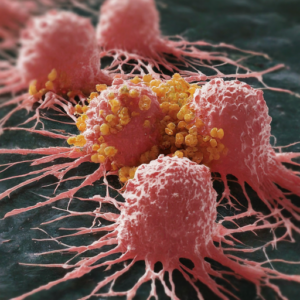Our immune system is complex beyond comprehension.
It acts as a vigilant guard, constantly patrolling for and eliminating threats like viruses, bacteria, and even abnormal cells that could turn cancerous. Cancer is a cunning adversary. New research from a collaborative effort by scientists at the Massachusetts Institute of Technology (MIT), Dana-Farber Cancer Institute, Harvard Medical School, and other institutions sheds light on a mechanism by which early-stage colon cancer cells manage to evade this crucial immune detection. Their findings, published in the journal Nature, offer a potential new target for treating colon cancer in its earliest stages.
RELATED: Meet Lew Bender, CEO, Intensity Therapeutics
The study focused on understanding how colon cancer, which typically arises in the lining of the colon, manages to initially bypass the immune system. The culprit, researchers discovered, appears to be a gene called SOX17. When activated in precancerous or early-stage colon cancer cells, SOX17 equips them with a stealthy ability – they essentially become invisible to the immune system. This newfound cloak of invisibility allows these potentially cancerous cells to flourish undetected, potentially developing into more advanced tumors.
The Immune System’s Line of Defense and How Cancer Breaches It
Our immune system employs a multi-layered defense strategy to identify and eliminate abnormal cells. One key component of this defense involves molecules called interferons, which act as signaling flags. When immune cells detect suspicious activity, they release interferons, alerting nearby healthy cells to the potential threat. These healthy cells then express specific proteins on their surface, essentially wearing a flag that says, “I’m infected or abnormal – eliminate me!” This signals immune cells to trigger programmed cell death in the flagged cells, effectively stopping the threat before it can escalate.
However, cancer cells have evolved various strategies to disarm this immune response. One way they achieve this is by preventing the production of interferon receptors on their surface. These receptors are akin to docking stations for interferon molecules. Without these receptors, cancer cells essentially become deaf to the immune system’s warning signals, allowing them to proliferate unchecked.
SOX17: The Mastermind Behind the Invisibility Act
The research team at MIT and collaborating institutions discovered that the SOX17 gene plays a pivotal role in this immune evasion tactic. Their experiments revealed that when SOX17 is activated in early-stage colon cancer cells, it disrupts the production of interferon gamma receptors, a specific type of interferon receptor crucial for immune recognition. This effectively renders the cancer cells invisible to the immune system’s interferon-based detection methods.
The researchers conducted their experiments using laboratory-grown human mini-tumors that mimicked early-stage colon cancer. When they analyzed these mini-tumors, they observed a significant increase in SOX17 expression compared to healthy colon tissue. Further investigation revealed that blocking SOX17 activity or the pathway it triggers restored interferon gamma receptor production in the cancer cells. This essentially made them vulnerable again to the immune system’s detection and elimination.
A New Hope for Early-Stage Colon Cancer Treatment
These findings hold immense promise for the development of novel therapeutic strategies for colon cancer. Targeting the SOX17 gene or the pathway it activates could potentially offer a new avenue for treating colon cancer at its earliest stages, before it progresses into more advanced and aggressive forms.
“If we can find ways to target SOX17 or the proteins in its pathway, it could be a new approach to therapy for patients with very early stage colon cancer,” says Tania Jain, a research scientist at MIT’s Koch Institute for Integrative Cancer Research and one of the lead authors of the study.
The Road Ahead: Challenges and Potential
While the discovery of SOX17’s role in immune evasion is a significant advancement, further research is needed to translate this knowledge into effective clinical applications. Developing drugs that specifically target SOX17 or its associated pathway while minimizing side effects will be a crucial next step. Additionally, researchers will need to explore the effectiveness of this approach in human clinical trials.
Despite these challenges, the study offers a compelling new direction for colon cancer treatment. By focusing on early intervention and harnessing the body’s own immune system, this research paves the way for potentially more effective and personalized treatment options for patients with this prevalent form of cancer.
